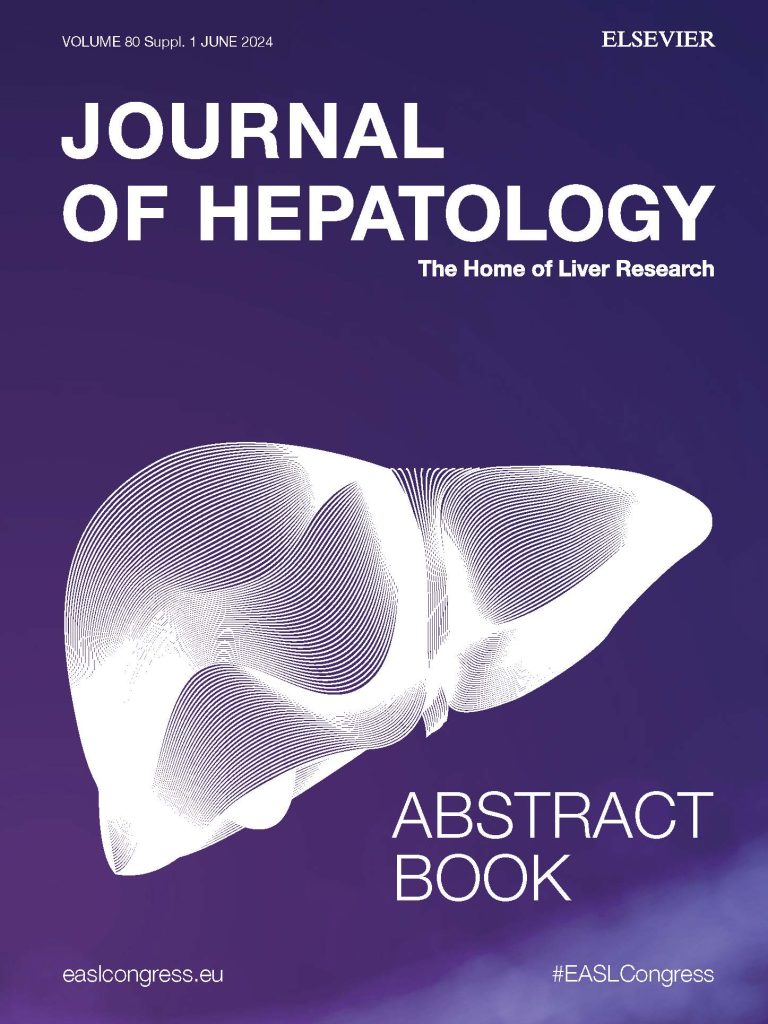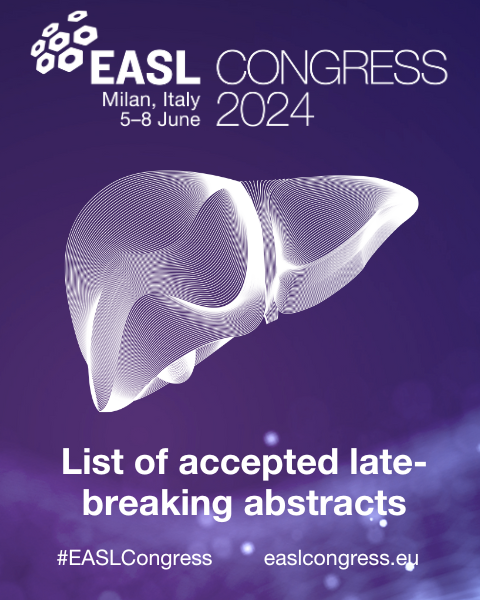Abstract Update
Late-breaking abstract notifications have been sent out!
Discover the list of confirmed late-breaking abstracts that will be presented in June!
Abstracts notifications have been sent out!
Discover the list of confirmed abstracts that will be presented in June!
Abstract and case submission
Shape discourse and drive hepatology innovation by submitting your abstract or case among 2,500+ entries. Selected abstracts and cases will feature in oral sessions or poster presentations, joining guided poster tours for engaging discussions and amplified insights.
Do you want to present your research at the EASL Congress 2024? Take a look at the categories for your field:
- Clinical Science
- Basic Science
- Public Health
- Nurses and Allied Health Professionals
Submission timeline
29 April 2024
Late breaker notifications
5-8 June 2024
EASL Congress 2024
Good news, your abstract been accepted! What’s next? Find out all you need to know to get ready to present your research at the EASL Congress 2024!
Why submit?

Be part of the leading event
The EASL Congress is renowned as the largest and most influential hepatology congress globally. By submitting your abstract or case, you become an essential contributor to this exceptional event.

Share your insights
Your research, findings, and expertise can make a significant impact on the field. Abstract or case submission is your avenue to share your insights with a diverse audience of hepatology professionals, researchers, and experts.

Shape the conversation
By presenting your work, you have the opportunity to shape the conversations and discussions that will drive the future of hepatology. Your can ignite new ideas and avenues of exploration.

Engage with experts
EASL provides you with the platform to engage with leading experts, peers, and thought leaders in the field. The congress facilitates meaningful interactions that will enrich your understanding and network.

Recognition and awards
Outstanding contributions deserve recognition. Submitting your research could lead to awards and accolades, acknowledging the value and impact of your work.

Professional growth
Participation in the EASL Congress will enhance your professional growth, offering opportunities for learning, collaboration, and career development.
Requirements and guidelines
Steototic liver disease (SLD) is the new overarching term with metabolic dysfunction-associated liver disease (MASLD) replacing nonalcoholic fatty liver disease (NAFLD).
To summarise:
- Steatotic liver disease (SLD) is the overarching term to encompass the various aetiologies of steatosis.
- Nonalcoholic fatty liver disease (NAFLD) will now be metabolic dysfunction-associated steatotic liver disease (MASLD). MASLD encompasses patients who have hepatic steatosis and have at least one of five cardiometabolic risk factors.
- A new category, outside pure MASLD, termed MetALD (pronunciation: Met A-L-D) was introduced to describe those with MASLD who consume greater amounts of alcohol per week (140 g/week and 210 g/week for females and males respectively).
- Metabolic dysfunction-associated steatohepatitis (MASH) is the replacement term for NASH.
- Those with no metabolic parameters and no known cause have cryptogenic SLD.
When submitting your abstract, always use the new nomenclature as long as feasible.
If the outdated terminology is used in reference to an old or ongoing trial or in reference to a publication etc., this would be an exception.
Detailed information about the nomenclature consensus process is available in the Journal of Hepatology
| Prior term | Recommended term | Abbreviation |
| Alcoholism | Alcohol use disorder | AUD |
| Alcoholic | Person with alcohol use disorder | |
| Alcoholic hepatitis | Alcohol-associated hepatitis or alcohol-related hepatitis | AH |
| Alcoholic liver disease | Alcohol-associated liver disease or Alcohol-related liver disease | ALD |
| Alcoholic cirrhosis | Alcohol-associated cirrhosis or Alcohol-related cirrhosis | AC |
Abstract submitters from Ukraine and low-income economies* will be exempted from the EUR 50 required to submit their abstract(s). If you are from one of these countries, you can submit your abstract cost-free.
*As per the World Bank classification
Low-income economies refers to this listing of these 29 countries: Afghanistan, Burkina Faso, Burundi, Central African Republic, Chad, Congo Dem. Rep, Eritrea, Ethiopia, Gambia The, Guinea, Guinea-Bissau, Haiti, Korea Dem., People’s Rep., Liberia, Madagascar, Malawi, Mali, Mozambique, Niger, Rwanda, Sierra Leone, Somalia, South Sudan, Sudan, Syrian Arab Republic, Tajikistan, Togo, Uganda, Yemen Rep.
Abstract topics
The Scientific Committee is looking forward to receiving your abstracts on these major topics:
Basic Science, Cirrhosis & Complications, General Hepatology, Immune- mediated & Cholestatic Diseases, Liver Tumours, Metabolism, Alcohol & Toxicity, Viral Hepatitis, Public Health.
- Acute liver failure and drug induced liver injury
- Alcohol-related liver disease and MetALD
MASLD: Clinical aspects except therapy
MASLD: Diagnostics and non-invasive assessment
MASLD: Experimental and pathophysiology
MASLD: Therapy
- Cirrhosis and its complications: ACLF and Critical illness
- Cirrhosis and its complications: Experimental and pathophysiology
- Cirrhosis and its complications: Other clinical complications except ACLF and critical illness
- Cirrhosis and its complications: Portal Hypertension
Liver tumours: Clinical aspects except therapy
Liver tumours: Experimental and pathophysiology
Liver tumours: Therapy
Viral Hepatitis: Experimental and pathophysiology
Viral hepatitis A/E: Clinical aspects
Viral hepatitis B and D: Clinical aspects
Viral Hepatitis B and D: Current therapies
Viral Hepatitis B and D: New therapies, unapproved therapies or strategies
Viral Hepatitis C: Clinical aspects including follow up after SVR
Viral hepatitis C: Therapy and resistance
- Immune-mediated and cholestatic disease: Clinical aspects
- Immune-mediated and cholestatic: Experimental and pathophysiology
- Fibrosis / Stellate cell biology
- Gut microbiota and liver disease / Liver-organ crosstalk
- Hepatocyte biology
Liver development and regeneration
Liver immunology
Liver transplantation and hepatobiliary surgery
- Non-invasive assesment of liver disease except MASLD
- Rare liver diseases (including paediatric and genetic)
Public Health: Except viral hepatitis
Public Health: Viral hepatitis
Nurses and Allied Health Professionals
Abstract submission rules for EASL Congress 2024
Abstracts that have been presented in previous non-EASL International Gastroenterology/Hepatology meetings are NOT accepted.
WARNING: If this rule is not respected, the abstract will be rejected and will not be considered for EASL Congress 2024.
“If my abstract is accepted for presentation (oral or poster) at the EASL Congress 2024, I agree to present my abstract at the congress. I declare that my abstract contains original research that has not been published or accepted for publication for another conference and/or in a print or online journal.”
All accepted abstracts submitted in this format (abstract/late-breaker abstract) will be either presented as:
- An oral presentation or
- A poster presentation
The abstract submission fee for the EASL Congress 2024 is:
- EUR 50 for regular abstracts
- EUR 100 for late breaker abstracts
- VAT may apply for residents in Switzerland only (8.1%)
- All changes can be made by the abstract submitter until the abstract submission deadline.
- After the abstract submission deadline only the presenting author can be changed until 3 weeks prior the event start date
- After you submitted your abstract, requests for withdrawal of an abstract must be received in writing to abstracts.easlcongress@easloffice.eu
latest until the abstract submission deadline
- No refund will be granted after the submission deadline
- Any withdrawal requested after the abstract submission deadline of the given EASL meeting will not be considered and the abstract will be published
- Past the submission deadline EASL cannot guarantee the withdrawal of an accepted abstract to all paper and/or electronic publication(s).
The submitting author of the abstract must indicate:
- Conflict of interest: For each author, any relevant financial relationship with the provider of commercial products or services discussed in their educational presentation or that have directly supported the CME activity through an educational grant to the sponsoring organisation(s).
- Off label products: If the product, that is discussed in the abstract, is not labelled for the use under discussion or that the product is still investigational.
Note: The intent of disclosure is not to prevent a participant with financial or other relationships from making a presentation, but rather to provide participants with adequate information about the relationship(s).
Embargos according to the category of submission
A detailed breakdown of the embargo policies for different types of abstracts is available below. All conference delegates, presenters, industry employees, sponsors, and media agree to respect this policy when submitting their abstracts or registering for the event.
A. Accepted abstracts selected for the following sessions may not be disclosed before the start of EASL Congress 2024 at 08:00 CET on Wednesday, 05 June 2024 (the opening day of the congress).
-
- General Session I
- General Session II
- Late-breaker Session
B. EASL Congress Late-breaker abstracts (poster presentations only): Data from abstracts submitted during the late-breaker submission period and which have been selected for poster presentation may not be disclosed before the start of EASL Congress 2024 at 08:00 CET on Wednesday, 05 June 2024 (the opening day of the congress).
C. Accepted abstracts selected for the following sessions should not be disclosed before 08:00 CET on Wednesday, 22 May 2024 (i.e. two weeks before the start of the congress).
-
- Oral sessions (excluding General Session I, General Session II, Late-breaker Session)
- Poster sessions
Examples of breaking the embargo include publishing data from the abstract in a journal or via a public outlet before the abstract is presented at the congress. Violation of the embargo policy above will be taken seriously. Individuals and/or sponsors who violate it may face sanctions relating to current and future abstract submissions, presentations, and visibility at EASL events. The EASL Governing Board is at liberty to ban attendance and/or retract data.
If you find out that data from an abstract you submitted to EASL Congress 2024 is scheduled for publication prior to the lifting of the embargo, please inform the EASL Congress 2024 team immediately at abstracts.easlcongress@easloffice.eu .
Please direct any questions or concerns about the EASL Congress embargo policy for authors and presenters to the EASL Congress 2024 team at abstracts.easlcongress@easloffice.eu .
Commitment from submitter:
In submitting my abstract, I agree to abide by the conditions of EASL’s embargo policies. Should my abstract be accepted, I agree that I will refrain from sharing any of the findings or data of my abstract until the time when the embargo on my abstract lifts. If my abstract is selected for publication online or in print, before my embargo date, I commit to informing EASL immediately via email at abstracts.easlcongress@easloffice.eu .
Commitment from EASL:
In accepting your abstract submission, EASL commits to the following statement
The content belongs to the author(s). However, if the abstract is accepted, the submitter agrees, on behalf of all co-authors, to transfer and assign to EASL free of charge, on a non-exclusive basis, for twenty years from the present submission, the rights to edit, publish, reproduce, reformat, distribute in whole or in part the abstract and prepare all type of derivative works such as press releases and/or educational products, using all communication tools and means, now known or hereinafter developed, including any and all digital means and any and all supports or forms of media, now known or hereinafter developed, in particular all paper, analog, digital, numerical and electronic media, including Internet, Intranet and Extranet sites and social media. This includes use in indexes or search databases in print, electronic, or other media.
Author(s) retain the right, after presentation, to subsequently include the work in articles, books, or derivative works that he/she authors or edits, provided said use does not imply the endorsement of EASL.
The submitter signs for all co-authors. He/she accepts responsibility for the present rules for submission and presentation on behalf of all co-authors.
Solve the Case
“Solve the Case” is an interactive session in which you can discuss your case with experts. The case does not necessarily have to be rare or complex; what is important are the questions and advice you need from the experts. If you have doubts on the diagnosis, on therapy or on general management you will discuss them with EASL experts.
Solve the case submission is now closed. Notifications on acceptance of your case will be sent on 12 April.





